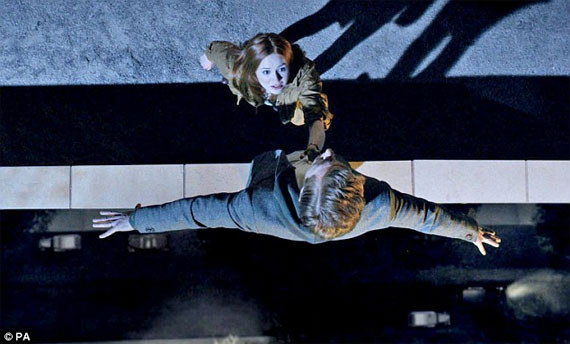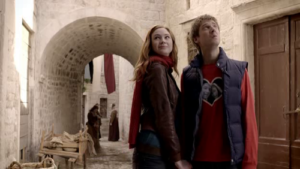‘Changing The Future; It’s Called Marriage,’ Part 2
(Continued from part 1.)
Sacrifice
Rory Williams — Christ-type.
 Yes, in Doctor Who’s midseason finale, “The Angels Take Manhattan,” Rory even spread his arms wide as he stood atop that roof ledge, ready to give his life to save not only himself from a lonely, imprisoned future, but the city of New York.
Yes, in Doctor Who’s midseason finale, “The Angels Take Manhattan,” Rory even spread his arms wide as he stood atop that roof ledge, ready to give his life to save not only himself from a lonely, imprisoned future, but the city of New York.
Everyone laughed at how often Rory died in the series, either for real or only in visions.
After death no. 2 (shot by a Silurian, then eroded from reality by a time-crack) I began to wonder: You idiots. That’s the whole point. Not only did Rory’s deaths and revivals generate notoriety and meme-level amusement, but they were based on the fact that one can’t have a truly great story without echoing the Biblical truth of resurrection. So why not roll with it? Especially if the point was for Rory to become a true hero?
Rory wasn’t the only sacrificial giver. Amy sacrificed her childhood hero, the Doctor, her “Raggedy Man” who crashed in her yard. In one way she blinked, yet also did not flinch, as she bid farewell to the Doctor and stepped into another time, to reunite with her true love.
God-given marriage
“The Ponds.” Some people say their storyline was scum. (Presumably “Pond scum.”) Why?
Maybe people dislike seeing a stable relationship.
Maybe they have been trained by other television shows that the only interesting story relationship is one that is constantly threatening to break apart.
Maybe, similar to the Doctor, they can’t stand happy endings to a love story. Stories that don’t simply delay and withhold true love, but pursue it to its finish.
 Throughout Doctor Who’s Pond-centric episodes, viewers watched Rory and Amy grow up, fall in love, marry each other, become parents, lose and find their child, change jobs, and fight to save their marriage from monsters of normal life (and actual monsters). Finally, they were ready to die together in one other’s arms, after Amy’s potentially final words:
Throughout Doctor Who’s Pond-centric episodes, viewers watched Rory and Amy grow up, fall in love, marry each other, become parents, lose and find their child, change jobs, and fight to save their marriage from monsters of normal life (and actual monsters). Finally, they were ready to die together in one other’s arms, after Amy’s potentially final words:
The Doctor: “What the hell are you doing?!”
Amy: “Changing the future. It’s called marriage.”
Have you noticed my references to “the Ponds”? This follows the story’s constant hinting that Rory took Amy’s last name, not vice-versa. Ha ha, see? It is Not What You Expected. It is Counter-Cultural. It’s subversive.
Or not.
Later, this is what we see on their gravestone:
In Loving Memory
Rory Arthur Williams
Aged 82And His Loving Wife
Amelia Williams
Aged 87
Rory’s name first? Rory Williams? “His loving wife”? Amy Williams?
How un-hip. How chauvinistic. How un-progressive. How horribly “boring.”
Yet viewers, perhaps strung-out on love triangles, constant banter for little purpose, cast changes, and immature adolescent phobias of commitment, were left weeping.
As I wrote before, few would weep over two homosexual men in these roles. Those notions are only good for sprinkled and possibly network-diversity-mandated “jokes,” sidekick characters, or else guilt-tripping art-house movies. But never for a transcendent love story.
God-given love, sacrifice, and marriage — flagrantly celebrated and honored.
End of the story
I suppose we should have seen this coming. Moffat said he hoped to make Doctor Who more like a fairy tale than straight-up science fiction. You may disagree with that approach. But consider the differences and strengths in either genre (both of which I love).
- Science fiction stresses an unlimited future. Parallel possibilities. Always a way out. Moral nuance and conflict. Overlapping timelines and changed actions.
- Fairy tales stress a beginning, a middle, and an end. Only one possibility. Rules that can’t be broken. Moral good and evil. Actions that have permanent consequences.
Doctor Who has taken the best of both genres’ worlds and combined them into one entity.
For that, I believe Grand Moff Moffat deserves more praise, not only complaints and rants.
After all, do we really want to be like the Doctor himself — a reflector of the best and worst of humans? Many reviewers noted with shock that the Doctor, twice, instinctively begged Amy not to leave him, even if that meant she left Rory. Amy didn’t flinch; she had chosen her man. Why did the Doctor do this? The answer seems clear: he doesn’t like endings. Finality. Commitment. Predictability. “Boredom.” Instead he’ll yank a lever and rush off to a newer time, location, companion, adventure, mystery, storyline, even universe.
Ah, but this time is different. The Doctor is faced with a Finality, not only because of the Ponds’ finished story but because of his own. He has already witnessed the end of his own marriage, and despite his initial attempts, resigned himself to being irrevocably joined with his wife. His stories constantly recur, science-fiction style. Yet hers will not.
Still a Pond-hater, because of their story’s insistence on permanence? Then you’re behaving like a child, or a fickle immature Time Lord — and not in a good way.






























One of the trailers had the line–“Every story has a beginning, a middle and an end. But not necessarily in that order.”
As for the season as a fairy tale, I’ve seen some beautiful Tumblr posts comparing each new series companion to a fairy tale: but series five was the first to invoke it with the Doctor’s comment
“Amelia Pond. Like a name in a fairy tale.”
Other comments in season five include
Doctor: “The Pandorica? That’s a fairy tale.”
River: “Aren’t we all?”
The Doctor: You know fairy tales. A good wizard tricked it.River: I hate good wizards in fairy tales. They always turn out to be him.
Doctor to sleeping Amelia Pond: When you wake up, you’ll have a mum and dad, and you won’t even remember me. Well, you’ll remember me a little… I’ll be a story in your head. But that’s OK. We’re all stories in the end. Just make it a good one, eh? Cause it was, you know. It was the best.
And in season seven, we get this line, Amy’s last words to the Doctor.
Tell her this is the story of Amelia Pond, and this is how it ends.
I love the fairy-tale tone of seasons 5-7– five has the “happily,” but six and seven are the “ever after,” the fact that no real life ending is as smooth as the stories. And the ending…oh, I just keep thinking PONDS! MY PONDS! because this was a good fairy tale.
It was the best.
On a more humorous note
Oh wow, I didn’t know that about Moffat wanting to make it more like a fairy tale. And it’s so true.
Looking ahead, you know how people are railing about how the Doctor’s true name will be revealed? It won’t. That’s the point of the prophecy. The question will be asked that must never be answered, and silence will fall.
Except we already know the Doctor told River his name. So she’ll be there. But it will kill the Doctor, because it’s the Fall of the Eleventh. So, essentially, we’re hurtling toward the Doctor being forced to commit suicide. How will this fairytale end?
But I’m so glad the Ponds got a happy ending. I always was afraid that Amy would leave Rory for the Doctor, which is so yucky. I’m glad she stood by her Roman. I loved that line Rory said, “I’ll come back to life! Don’t I always?”